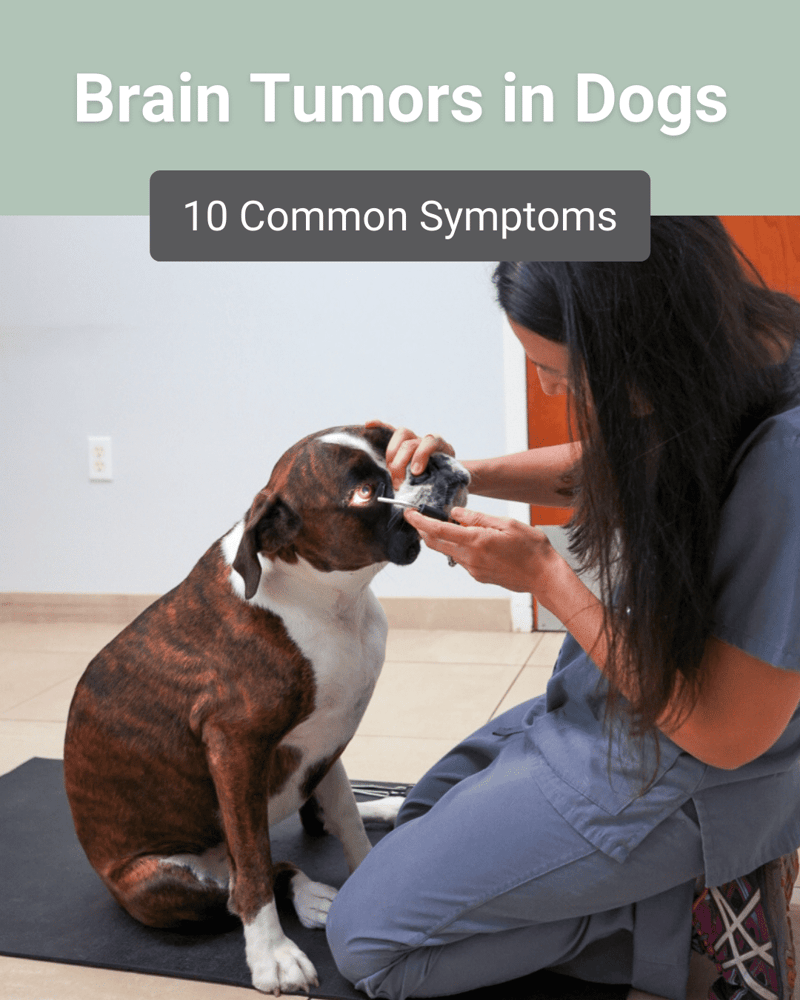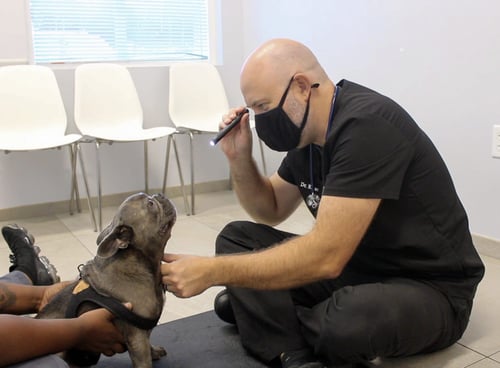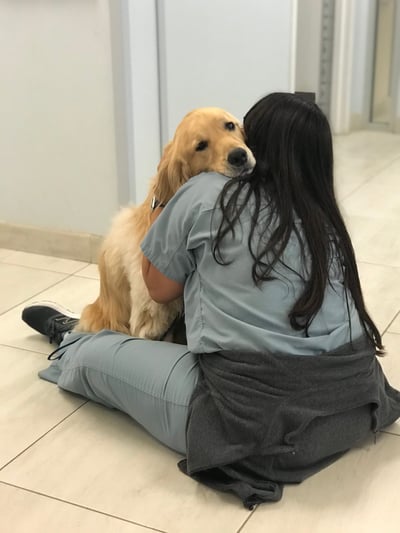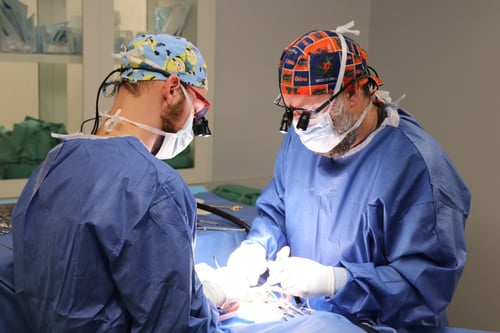10 Common Brain Tumor Symptoms in Dogs
Out of all the neurological conditions that can affect dogs, especially our older canine companions, brain tumors are actually quite common. So if you’re a dog mom or dad, you’ll want to be able to recognize brain tumor symptoms in dogs.

What Is a Tumor?
A tumor is an uncontrolled growth of cells within tissue. These abnormal cells create masses that destroy healthy tissue. Therefore, a tumor in the brain will cause brain damage, resulting in serious neurological symptoms.
Types of Brain Tumors in Dogs
There are two main types of brain tumors in dogs: primary and secondary.
Primary
Primary brain tumors develop from cells that make up the lining of the brain and the brain itself. There are four types of primary brain tumors in dogs:
- Meningioma arising from the coverings of the brain
- Glioma arising from the support cells of the brain
- Ependymoma arising from the lining of the fluid-filled spaces of the brain
- Choroid plexus tumors arising from the cells that help produce spinal fluid
Secondary
Secondary brain tumors, on the other hand, are tumors that originate somewhere else in the body and then spread to the brain, a process known as metastasis.
What Causes Brain Tumors in Dogs?
“What causes brain tumors in dogs is not easy to answer, as we don’t truly know,” says Dr. Michael Reese, Veterinary Neurologist at Southeast Veterinary Neurology. “There are thoughts that there are both genetic and environmental factors that can contribute to cancer development.”

Environmental Factors
Examples of environmental factors that may contribute to brain tumors in dogs include:
- Dietary
- Chemical
- Viral
- Traumatic
- Immune system
Genetic Factors
While it’s possible for any dog to develop cancer in their older years, it might be worth noting that some breeds do seem to have a higher risk. This list includes some popular pooches, like:
- French Bulldogs
- Boxers
- Boston Terriers
- Golden Retrievers
- Doberman Pinschers
- English Bulldogs
Brain Tumor Symptoms in Dogs
Brain tumors are typically seen in dogs over five years of age, and symptoms vary depending on where the tumor is located in the brain.
Forebrain Tumor Symptoms in Dogs
Symptoms of tumors located in the front part of the brain include:
Seizures
Idiopathic epilepsy generally occurs in younger dogs, so when an older dog develops an acute seizure disorder, brain tumors must be on the list of possible diagnoses.
Circling
Another very common symptom of a tumor in the front part of the brain is a dog compulsively walking in circles, completely incapable of following a straight path.
Blindness
Forebrain tumors in dogs can also cause acute blindness in one or both eyes.
Behavior Changes
Another fairly common brain tumor symptom in dogs is a change in behavior. Your dog is suddenly just not itself, and it may seem lost, withdrawn, irritable, or to have lost normal learned behaviors.

Hindbrain Tumor Symptoms in Dogs
Symptoms of tumors located in the back part of the brain include:
Mentation Changes
“Tumors in the back part of the brain can cause changes in your dog’s level of alertness, making them seem more tired or dull,” explains Dr. Reese.
Ataxia
Hindbrain tumors can cause wobbly or uncoordinated walking.
Head Tilt
Another possible symptom of a tumor in the back part of a dog’s brain is a head tilt to the side.
Nystagmus
Abnormal movement or darting of the eyes is a common symptom of a brain tumor that is affecting a dog’s balance system.
Paresis
Hindbrain tumors can cause weakness in the limbs.
Hemiparesis
“Brainstem tumors often cause weakness on one side of the body. Unlike people, dogs do not have a motor cortex, so weakness is not commonly seen with forebrain tumors,” notes Dr. Reese.
How to Care for a Brain Tumor in Dogs
If you are wondering how to care for a brain tumor in dogs, the first step is visiting a veterinary neurologist as soon as possible. Since different diseases can look the same on the outside, it’s critical to have your dog evaluated by a professional.
There are actually many other neurological conditions that cause what look like brain tumor symptoms in dogs. It’s important to remember that these symptoms only tell us where in the nervous system the problem is located. They do not necessarily tell us that a brain tumor is the cause.
High-field MRI is, hands down, the best tool for diagnosing brain tumors in dogs. It allows a trained veterinary neurologist to clearly view the location, shape, and size of the tumor, providing a much better idea of what kind of tumor it is and how to best care for it.
Treatment for Brain Tumor in Dogs
While the diagnosis of a brain tumor in your dog might come as a shock, there are options. Available treatments include:
- Surgery
- Chemotherapy
- Radiation therapy
Surgery, performed by an experienced board-certified veterinary neurologist, is used to remove all or part of brain tumors in dogs, while chemotherapy and radiation therapy are used to try to shrink brain tumors in dogs and slow their growth.

“Another treatment option is palliative care, using medications to help try to maintain a good quality of life for as long as we can,” adds Dr. Reese.
Contact Southeast Veterinary Neurology if You Are Worried about Brain Tumor Symptoms in Your Dog
If your faithful friend is experiencing any of these brain tumor symptoms in dogs, please contact Southeast Veterinary Neurology right away. We have teams of compassionate experts in Miami, Boynton Beach, Jupiter, and Virginia Beach that are ready to put your pup on the road to recovery. Call any of our locations or schedule a consultation online today.